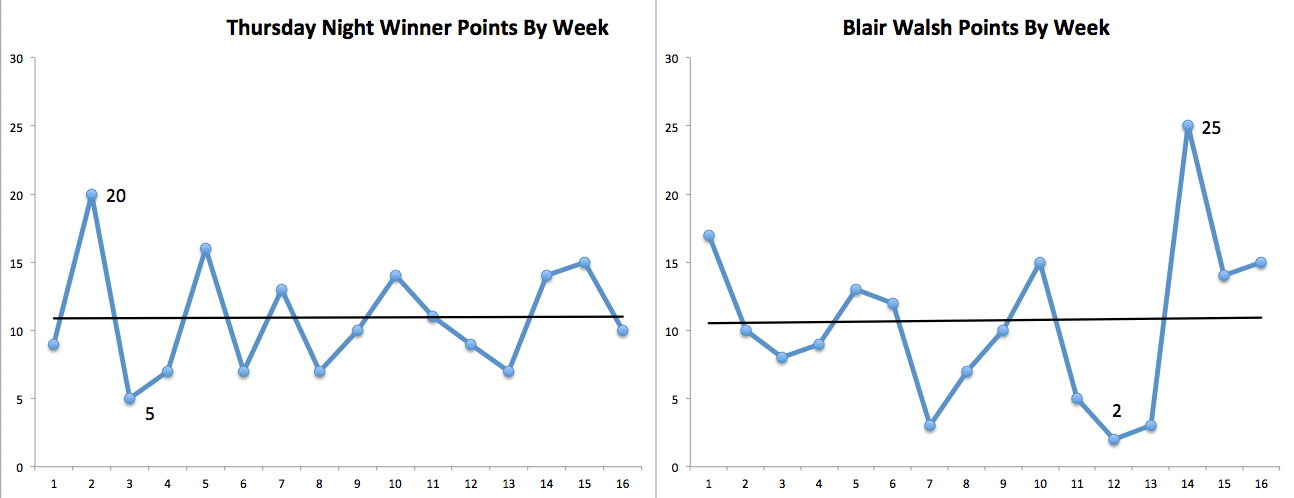There are three main drafting guidelines I always follow when it comes to fantasy drafting: try to set positional runs instead of following them, try not to overrate your favorite team’s players, and never draft a kicker until the last round.
The logic seems simple in all cases: you don’t want to be overrating players due to scarcity at a particular position, the normal fan tends to be more optimistic on their own players, and kickers’ production is too random to use a high pick on. The last one in particular is difficult for me to stomach. Sure, it’s not easy to foresee phenomenal kicking season largely because there are so many different variables that alter how often a kicker attempts field goals: offensive potency, coaching risk-tolerance, defensive ability to keep the game close, range, etc.
I always think I can be ahead of the curve on the next big season for a kicker. Going into the 2012 season David Akers had just notched a record 190 fantasy points[1]. He was the beneficiary of a perfect set of circumstances. In many of my drafts people reached for Akers a round or two earlier than the traditional “kicker rounds” hoping that the circumstances would remain the same. They didn’t. Akers was a huge disappointment due to his lack of accuracy and attempts. With the conservative Alex Smith benched for the more electric Colin Kaepernick, the 49ers offense was no longer the low-scoring defensive-oriented football team they were in 2011 and Akers’ point total nearly halved as a result.
None of this is new information to you, of course. But in an attempt to finally disprove that kickers will give you a more or less random score every week, I tried to isolate a few variables that seemed to contribute to strong kicking performances:
#1 Close Games
Regardless of how many total points are scored kickers usually score more points if games come down to the wire and last-minute drives are made for field goals. Also with new overtime rules allowing the kicking team the ball if the receiving team scores a field goal in their first possession, the potential for more kicker points is even higher.
#2 National Reach
Something of an opinion here, but I absolutely hate it when I have multiple high profile players on a Sunday or Monday night. It seems like the hype and excitement always culminates in disappoint and players usually score less than they’re expected to. I look for kickers to excel when offenses or defenses are good, but not great, and often primetime games play out that way.
#3 Short preparation
Along the same lines, it seems like kickers get the most opportunities when both the offense and defense are not as sharp as they could be. There are sustained drives that occur, but a higher likelihood of them stalling in the red zone or just outside of it.
For me, these factors culminated in the newly expanded Thursday Night Football games on NFL network. Thursday Night games feature closer match ups (usually division games or picked based on expected skill levels), they result in a significantly shorter week of practice, and, although it doesn’t match the grandeur of ESPN’s Monday Night Football (I know you are a company man, Matthew), they do have some prime-time feel. The kicker (no pun intended) is that many of the starting kickers on Thursday night are obscure enough that you can pick them up week-to-week. My theory is that you should take a “plug-and-play” approach to your kicker based on the Thursday Night match up.
Not only did this kicker hunch lead me to a fantasy championship in both of my leagues, I think it can continue to produce consistently strong results. Blair Walsh led all fantasy football in points this season for kickers with 168 or 10.5 points per week. For comparison, if you could predict the kicker that would score more points on a Thursday Night (it’s a 50-50 shot after all), you would have scored a weekly average of 12 points per game.[2] But that has to just be luck, right? I mean kickers produce at complete random, don’t they? But let’s say that you picked up and started the kicker on the team you thought would win the game. The winning kicker scored an average of 10.88 points per week.
What does this mean? If you can pick the winning kicker in Thursday Night Football games you can outscore the highest rated kicker of the year. But there’s more to this strategy than total points; you also get consistency. Let’s delve into Walsh’s numbers a bit, for all of his high point weeks (including his 25 point performance in Week 15), he had many low-scoring weeks. The variation between his high and low scoring weeks is reflected in a ‘standard deviation’ of 7.33 points over the year. Standard deviation is a measure of how closely clustered the values are to the mean. In a normal distribution 68.2% of values will fall within one standard deviation of the mean. For Walsh, this means that close to 70% of his point totals will be as high as 18 points or as few as three. Simply put, his standard deviation of 7.33 looks wildly erratic compared to my Thursday Night strategy’s standard deviation of 4.11 points per winning kicker. So not only do Thursday night winning kickers score more on average, but they also score more consistently than the best individual kicker. We’ve all had those weeks when you locked in a close fantasy match up and your kicker scores a measly two points (like Walsh did in week 13). As a fantasy owner, I crave consistency in my kicker just like I do from any other position.
Now I am not just picking on Walsh. The top three kickers of 2012 (Walsh, Gostkowski, and Bryant) all had relatively high standard deviations, averaging 5.04 between them. To emphasize the variability of individual kickers, lets look at where they were in 2011. While Gostkowski remained relatively consistent scoring 154 points and ranking fourth in the 2011 season, Matt Bryant had only 135 points and ranked 13th overall. While Walsh was still in college, Minnesota’s 2011 kicker, Ryan Longwell, amassed only 117 points good for 21st ranking among kickers. Granted Walsh’s big leg could have earned him more kicking opportunities than the aging Longwell, but the point remains that year-to-year there is a good amount of fluctuation in kicker performance. So think twice before convincing yourself that you know which kicker will emerge in 2013.
You may be thinking, “This is all nice and good in theory, but what happens if I have to start the kicker who ends up losing the game, what then?” Well on average the losing kicker scores 7 points per game, which, if annualized over a season, would be good for 24th best. However, the losing kicker also has less variability than the top-kicking trio with a standard deviation of 4.38. So while you may not have a ton of confidence in your ability to pick the winner of a Buffalo-Miami matchup, for example, you can still rest assured that the odds favor you having fewer really bad performances than the owner with the statistical “best kicker” in the league.
I may not have had years of data to properly convince you that this strategy is a worthy one, but it is fundamentally rooted in logic. Thursday Night games take many teams out of their element with short weeks of practice and prime time attention, while generally featuring equally matched teams. The numbers show there are more field goals attempted and made on Thursday nights on average, and significantly more if you can start the eventual winning kicker. If you want to play a hunch that you can draft the next great kicker in the ideal scoring situation like Akers in 2011, by all means take your shot. But if you are waiting to make your final pick this year, maybe give some consideration to Matt Prater or Justin Tucker who will face off to begin the 2013 season Thursday, September 5th.



















